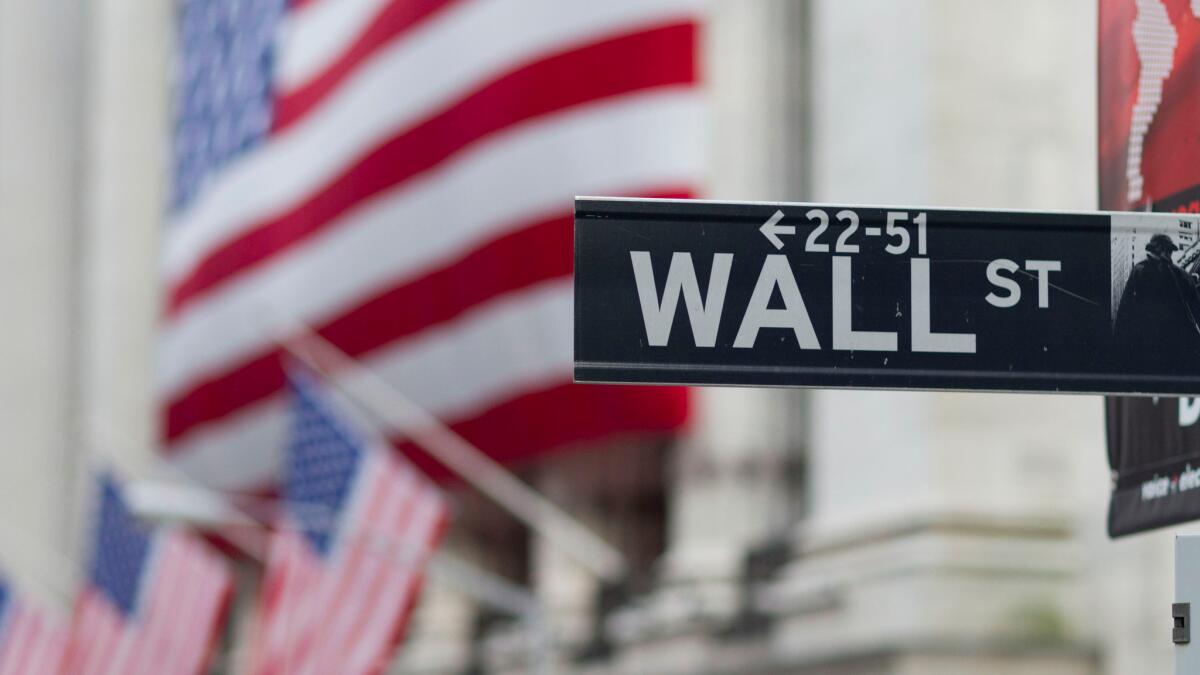Dow ekes out another record high; other stock indexes fall

- Share via
It was a split decision on Wall Street on Thursday as gains in a handful of industrial and healthcare companies largely outweighed sluggishness elsewhere in the market, including the technology sector.
Sizable gains by Boeing and United Technology were enough to push the Dow Jones industrial average to another record high, but other major indexes fell.
Retailers were weak after the government said prices paid by consumers jumped in August. That could prompt the Federal Reserve to raise interest rates sooner than expected in order to cool the economy and stave off inflation. Higher interest rates would hurt companies such as retailers that depend on shoppers spending money.
Energy companies rose as U.S. crude oil climbed to its highest price in six weeks.
The Standard & Poor’s 500 index slipped 2.75 points, or 0.1%, to 2,495.62. The Dow Jones industrial average rose 45.30 points, or 0.2%, to 22,203.48. It was the Dow’s third record-high close in a row.
The Nasdaq composite slumped 31.10 points, or 0.5%, to 6,429.08 as big names such as Facebook and Alphabet, Google’s parent company, lost ground. The Russell 2000 index of smaller-company stocks fell 1.87 points, or 0.1%, to 1,425.02.
On the New York Stock Exchange, there were slightly more winners than losers.
The Labor Department reported that U.S. consumer prices grew 0.4% in August as gas and housing costs rose. Prices are up 1.9% over the last year. That could show inflation is speeding up, though it’s not clear how much of the recent rise in gas prices was because of Hurricane Harvey, which deluged the Gulf Coast region in late August and caused many drilling rigs and refineries to shut down.
The Federal Reserve will meet next week, and investors wondered whether Thursday’s report makes the central bank more likely to raise interest rates again this year. Higher interest rates reduce growth because they make borrowing more expensive.
Michael Scanlon, a portfolio manager for Manulife Asset Management, said that if inflation does get stronger over the next few months, “it would be a sign of more health in the economy overall.”
Urban Outfitters fell 3.3% to $22.77, and discount retailer Ross Stores ticked down 1.3% to $60.60. Amazon slipped 0.7% to $992.21. Coca-Cola retreated 1.6% to $46.11. Grocery store operator Kroger fell 2.2% to $21.26.
Jewelry seller Tiffany slid 4.8% to $90.95 after one of its biggest shareholders, Qatar’s investment fund, said it sold some of its Tiffany stock.
Boeing advanced 1.4% to $245.23. Wednesday afternoon, the stock closed up 0.6% after CEO Dennis Muilenburg said the company expects to start delivering more planes. Other industrial companies also climbed Thursday. United Technologies rose 2.6% to $113.14.
Benchmark U.S. crude oil rose 59 cents, or 1.2%, to $49.89 a barrel. That was its highest closing price since the end of July. Brent crude, used to price international oils, rose 31 cents to $55.47 barrel in London.
Among energy company stocks, Schlumberger rose 1.2% to $67.70, and Anadarko Petroleum ticked up 0.9% to $43.53.
Lattice Semiconductor slipped after the U.S. government stopped the chipmaker from being sold to a firm backed by the Chinese government because of national security concerns. Lattice accepted the $1.02-billion offer from Canyon Bridge Partners in November, but investors have long been skeptical the deal would be completed. Last week, a U.S. government panel said the sale should be blocked.
Lattice wobbled between gains and losses and finished down 2 cents at $5.70. Canyon Bridge had agreed to pay $8.30 a share.
William Lyon Homes slid 5.3% to $23.47 after the homebuilder said Paulson & Co., its second-largest shareholder, will sell its stock.
The Bank of England kept its key interest rate at a record low but indicated that it could start raising rates sooner than markets have been expecting. That sent the pound higher and British stocks lower. A stronger pound would hurt the earnings of British companies that do a lot of business overseas.
Britain’s FTSE 100 fell 1.1%. The French CAC 40 rose 0.1%, and Germany’s DAX fell 0.1%.
Investors in Asia were disappointed after China’s National Bureau of Statistics said the world’s second-largest economy grew at a slower pace in August. The Japanese Nikkei 225 fell 0.3%, and Hong Kong’s Hang Seng index fell 0.4%. The Kospi in South Korea gained 0.7%.
Bond prices edged down. The yield on the 10-year Treasury note rose to 2.20% from 2.19%. The yield on the two-year note rose to 1.37% from 1.35%.
Wholesale gasoline fell 2 cents to $1.63 a gallon. Heating oil rose 1 cent to $1.78 a gallon. Natural gas rose 1 cent to $3.07 per 1,000 cubic feet.
Gold rose $1.30 to $1,329.30 an ounce. Silver fell 8 cents to $17.79 an ounce. Copper fell 2 cents to $2.96 a pound.
The dollar fell to 110.54 yen from 110.66 yen. The euro rose to $1.1914 from $1.1873. The pound jumped to $1.3398 from $1.3197.
UPDATES:
2:20 p.m.: This article was updated with closing prices, context and analyst comment.
This article was originally published at 7 a.m.
More to Read
Inside the business of entertainment
The Wide Shot brings you news, analysis and insights on everything from streaming wars to production — and what it all means for the future.
You may occasionally receive promotional content from the Los Angeles Times.










